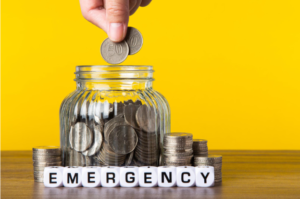
What Should I Do in a Financial Emergency?
Imagine that your car breaks down out of the blues or that you have to pay an unexpected medical bill. Even though they are unpleasant, these events do occur in life. A financial emergency can strike at any time and often without warning.
The important question is: In such a situation, what should one do? It’s important to make thoughtful, calculated decisions that protect your financial well-being rather than focusing only on quick fixes. This blog post will guide you through the actions you need to take in the event of an unexpected financial emergency.
Identifying a Financial Emergency
Before going into solutions, it’s important to define what constitutes a financial emergency. A financial emergency is an unforeseen circumstance that calls for quick financial action and, if left untreated, can result in serious financial or physical challenges. These are not your regular out-of-pocket costs or anticipated bills; rather, they are unforeseen and pressing.
Examples of Typical Emergencies
- Medical Emergencies: Accident or sudden illness that leads to high medical bills.
- Loss of Job
- Major Home Repairs: Urgent repairs like a leaky roof or a broken furnace during winter time.
- Car Repairs
- Urgent Travel
Understanding the difference between an actual emergency and an ordinary expense is important. It has nothing to do with when you want to take a trip by draining your savings. It’s about those times when not spending could have serious financial or even physical consequences.
Immediate Steps to Take in a Financial Emergency
When a financial emergency strikes, your initial reaction can have an impact on how well you manage the situation. It is essential to act both swiftly and carefully.
Analyzing the Situation
First, inhale deeply. Making snap decisions out of panic could make things worse. Assess the emergency’s seriousness and urgency first. Think about how urgent this expense is. Is there any way to postpone this or does it have to be addressed right away? Prioritizing your actions is made easier when you are aware of the extent of the emergency.
Creating a Short-Term Action Plan
Once you’ve assessed the situation, create a short-term plan.
- Making a list of immediate expenses: Determine which payments must be made immediately and which ones can wait.
- Assessing the resources at hand: Check your savings, emergency funds, and other liquid assets.
- Thinking about short-term solutions: In the event that the money is not immediately available, consider other means of getting money. This will be discussed below.
Do not forget that the goal is to bring the situation under control without jeopardizing your long-term financial security.
Accessing Emergency Funds

Your emergency fund should ideally be enough to cover three to six months’ worth of living costs. This money is reserved especially for financial emergencies. If you have an emergency fund, you can quickly take care of any emergency by reaching into it. After the emergency has been resolved, concentrate on building back the emergency fund in order to be ready for any future emergencies.
Alternatives if You Don’t Have Savings
If you don’t have a safety net and are in a financial emergency, think about these options:
- Sell Off Non-Essential Assets.
- Ask friends or family for a loan. This option often provides flexibility and no interest; however, in order to prevent strained relationships, it is necessary to be explicit about the terms of repayment, so you don’t ruin your relationship.
- Credit Card or Personal Loan. Finally, you could think about getting a loan. Pay attention to high interest rates and how they will affect your future financial situation.
Managing Debt During Emergencies
Still prioritize your debts and living costs when you have limited resources. These are necessary to keep up your living standard, this may include utilities, car payments, and mortgage or rent payments.
In an emergency, managing your debts entails determining which payments are most important and taking action to lessen the effect on your overall financial standing. It could be a challenging aspect of handling financial emergencies, but it is practicable with careful planning.
Seeking Advice
When you’re facing a financial crisis, it’s often a good idea to seek advice from a financial or debt experts. They can provide you with specialized guidance and ideas that you may not have thought of.
It’s time to get professional assistance if you find yourself feeling overburdened, unable to make wise decisions, or if the circumstances are seriously affecting your long-term financial goals. The debt experts at EmpireOne Credit are able to guide you through difficult situations, offer unbiased advice, and help you create a plan for handling your debt while you handle any emergency with ease.
Planning for Future Emergencies

Once you’ve managed a financial emergency, it makes sense to begin making future plans. The idea is to be more equipped in case another unexpected event occurs.
Creating an Emergency Fund.
Establish or add to your emergency fund first. Try to accumulate enough savings to pay for three or six months’ worth of expenses. If needed, start small and build up your savings over time. To reduce the temptation to use this fund for non-emergencies, it should be conveniently accessible but kept apart from your regular checking account.
Regularly Reviewing and Adjusting Financial Plans
- Review and refine your financial plan on a regular basis. Your financial plan should adapt to the changes in your life.
- Think about insurance options, such as health insurance, that can offer financial relief in specific emergencies.
- Periodically review and modify your budget in light of your goals and existing financial status.
Remember that juggling multiple debts with a financial emergency may stress you more and could get you deeper into debt. But do not worry, your debt can be reduced by up to 80%, and interest will stop immediately. Call one of our debt experts at EmpireOne Credit at (416) 900-2324 to schedule a free consultation. Being debt-free feels good!





